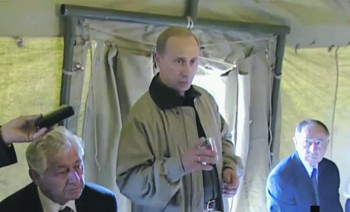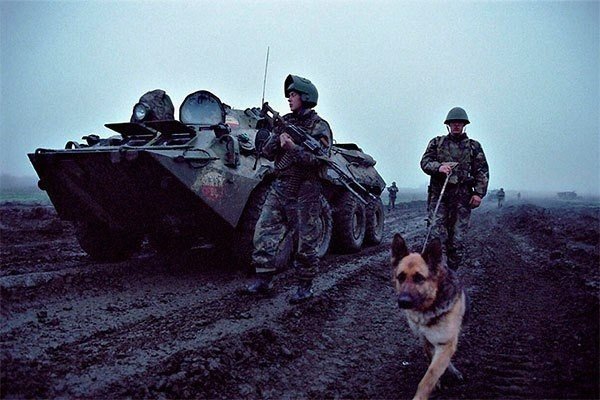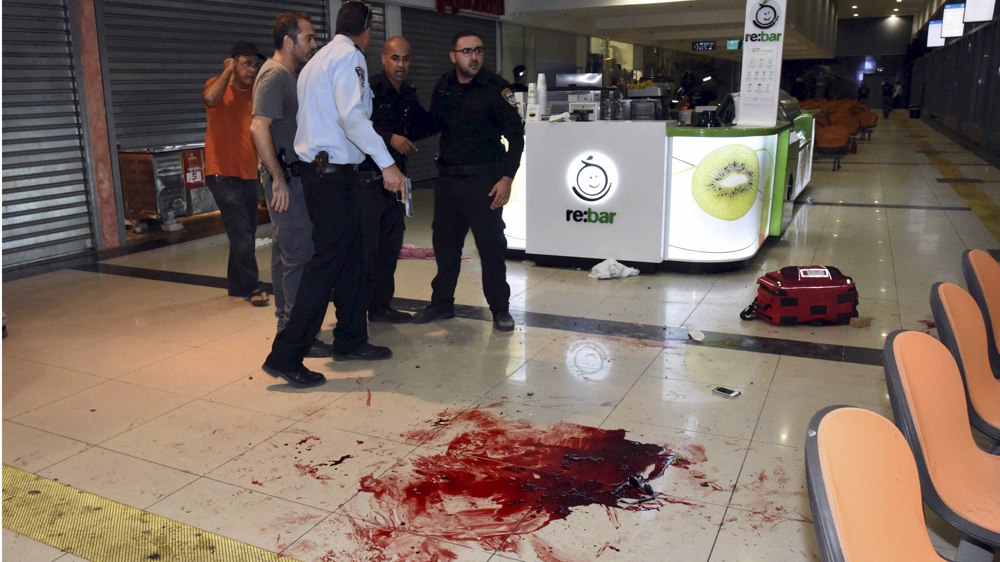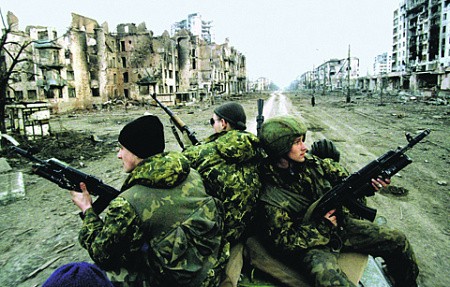
Federal troops are fighting in Grozny. photo: Reuters
AT 2019 a quarter of a century has passed since the beginning of the operation to restore constitutional legality and law and order in the Chechen Republic. Participant in those events, Major General, retired, Vladimir Gorodinsky, Ph.D. in Philosophy, wrote an unusual book "Caucasian fault: know and remember ".
Why did the Chechen armed conflict arise?? How did the service of Russian border guards in the North Caucasus actually evolve with 1994 by 2006 year? These and other questions are answered in the book.. It is based on documents, including those captured from militants, memories of participants in those events. The author's version of many facts and events differs from the official interpretation, from numerous articles and TV shows. Gorodinsky is sure: a significant part of the distortions were not made intentionally by the authors, they just do not know the problem, which they took. The closeness of departmental archives also "helped". General Gorodinsky recorded the stories of participants in many operations and battles.
We often talk about heroism, self-sacrifice. It is necessary. Many pages are devoted to this topic in the general's work.. But any war has many faces, there is also dirt in it, and desertion, and betrayal. Is it worth it to be ashamed to keep silent about it?? There are many bitter pages in the book, but what was - was.
Silencing the problem
To take up the author's book was prompted, in fact, suppression of those events. Here's what he installed. During the time after two Chechen companies in the border department, in universities of the border profile did not hold a single military-historical or scientific-practical conference, dedicated to the analysis of those events and assessment of the participation of border guards in them.
Of 12 historical works of scientists-border guards, released over the past decades, only three outlines cover this topic. In the rest - not a word.
None of the border guard commanders, who took part in the settlement of the Chechen conflict, didn't even write an article, where I would try to comprehend those tragic events. In two volumes of the book of the first director of the Federal Border Service of the Russian Federation, General of the Army Andrei Nikolaev, "Notes of a Russian Officer", this period is also not reflected in any way. Surnames of border guards, killed in the second Chechen campaign, still not included in the departmental Book of Memory.
A large number of inaccuracies and factual errors were made in historical and journalistic works.. Often, the exploits of some are attributed to others.. Some of the names of the officers were generally invented by the authors of the publications.. There is a lot of confusion when assessing the number of clashes between border guards and members of illegal armed groups (NVF), casualties on both sides. The works are saturated with excessive heroic pathos. Often unsuccessful battles for border guards, disorganization, as a result of which the units suffered losses, served as examples of high professionalism and military valor.
This approach orients the future defenders of the Fatherland towards easy victories over a strong and insidious enemy.. Shapkozakidatelny moods cost the people dearly in the Soviet-Finnish and Great Patriotic wars. Several years earlier, Vladimir Ivanovich wrote the book "The Truth of History or Mythology?"- about the actions of Soviet border guards during the Great Patriotic War. She first caused rejection of many veteran border guards. The author was even unfairly compared with the author of "Aquarium" and "Icebreaker" Viktor Suvorov. Later, the general was admitted to be correct..
Vladimir Gorodinsky in the border troops with 1967 of the year. Graduated from the Moscow Higher Border Command School of the KGB of the USSR, Military-Political Academy, Academy of Social Sciences under the Central Committee of the CPSU. He served in the Far Eastern and Trans-Baikal border districts, Caucasian Special Border District (everywhere - deputy commander), in the North Caucasus Regional Department of the Federal Border Guard Service of Russia (deputy chief). For two years he was the first deputy head of the Department of educational work of the Federal Border Guard Service of the Russian Federation, headed the Golitsyn Border Institute of the FSB of Russia. In reserve he worked as the rector of the Odintsovo University for the Humanities.

your pension. Can not be obtained to accumulate
War veteran. Awarded the Order of Military Merit and 19 medals, personalized weapon from the director of the Federal Border Guard Service of Russia and the director of the Federal Security Service of Russia.
We offer readers some chapters of an extraordinary work in a significantly abbreviated version..
The highlander was named after the chief border guard
With sunset in the village of Ziberhali, hiding behind a herd of cattle, included more 100 Chechen fighters. Resident Ziberhali Zh.Kh. was the first to find them.. Saadulaeva. She ran at a run towards the outpost (11st outpost of the 3rd motorized maneuverable group of the Zheleznovodsk border detachment of special purpose). With voice and gestures, the woman warned the border guards. The militants opened fire, the brave woman fell dead.
... In the first days after the battle in the border district and the Federal Border Guard Service, they talked about the need to present Saadulaeva to a state award (posthumously). The command of the border detachment announced: funds, collected by the military, a brave woman a monument will be erected.
gone 23 of the year. Working on this book, I asked, what award was noted for the feat of Saadulaeva Zh.Kh.. It turns out, her heroic deed has long been forgotten. And the state, and the Border Guard Service of the FSB of Russia, and the authorities of Dagestan. She was not awarded a state award. Nobody erected a monument to the heroine, did not help rebuild her house burned down by bandits.
Her father appealed to all authorities many times about previous promises and received only formal replies.. To the Minister of Defense Shoigu, he bitterly wrote: “Everyone forgot about the heroic deed of the mountain woman, children of Saadulaeva Zh.Kh.. lost their mother and home. offensive, that we do not value people, who gave their lives for their homeland, we do not set them as an example for the younger generation ". What will you add to these words?
Another case. Three residents of the village of Shauri went on foot to the neighboring village of Mokok, where was the border post. Reaching her about 2 am 15 December, they reported the appearance in their village of several Chechen fighters Gelayev.
But there were other, opposite examples. Once the border guards, breaking the Argun river, started moving up the gorge towards the village of Veduchi, two women ran out of the house and quickly hung a bright red blanket on the fence, which was clearly visible from all sides of the gorge. But as soon as the group turned back, as the blanket was immediately removed. Thus, relatives or supporters of the militants warn those about the danger that threatens them.. It also became clear, that the base of the gang is somewhere in the mountains, very close to Veduchi.
Was, of course, and assistance of border guards to local residents. 20 July 2001 of the year, border guards urgently delivered a woman in labor from the village of Itum-Kali by helicopter to the Vladikavkaz hospital. They saved the life of a young mountain woman and her child. As a token of gratitude, the young parents gave the boy the name Konstantin - in honor of the director of the Federal Border Service Konstantin Totsky.
"Fight" at the Blue Lake
24 August 1995 chief of the motor-maneuvering group, Major O. Zenkov returned from the headquarters of the detachment already a lieutenant colonel. C A. Novozhilov, also a lieutenant colonel, officers A. Dudin and V. Kachkovsky they went to Lake Kazenoy-Am (Blue Lake) to mark the awarding of the title. They took the BTR-80 with them and 10 border guards. On the way we learned from the shepherd: the day before, militants were spotted in the Harami pass area. But this did not alert the officers. By the lake we were convinced, that everything is calm, sent an armored personnel carrier with soldiers to the outpost. With the onset of darkness, Novozhilov's car did not return to the outpost.
We went from the outpost to rescue the officers. There was a fight - four killed, 14 man injured. How it all happened by the lake, hardly anyone will say in details today. one thing is clear: there was no clash and the overwhelming numerical superiority of the bandits over the border guards at that time. Novozhilov's group was taken to the village of Makazhoy, then transferred to Shatoi. Wasted the title ...
Due to your own carelessness and frivolity, you can die or be wounded in battle. You can also be captured, where the enemy is free to dispose of your fate, as he pleases. In these conditions, as in open battle, the true essence of a person is manifested. If from these positions we evaluate the actions of Lieutenant Colonel A. Novozhilov and his comrades in misfortune, then your, may be, the most important exam in life - the test of captivity - they passed with dignity.
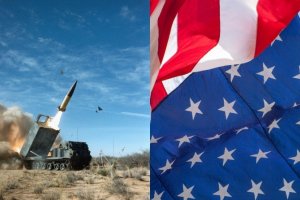
The US intends to carry out a test of a ballistic missile gap INF Treaty
In captivity they went through all the circles of hell. During the first months, the Chechens beat them mercilessly during interrogation.. Convinced: nobody needs you, at home as traitors will be shot. Inclined to accept their faith. Fed with a semblance of flour paste, diluted in water. December 1995 the militants allegedly gave the prisoners a bath in a bathhouse. Driving out of the "fox holes", in which they lived, in the cold, ordered to undress and 15 minutes were poured from a hose with lukewarm water. The prisoners called the washing "Karbyshev's bath". Several people died after her.
Dampness and slush in the spring caused colds and pneumonia in many, which quickly finished off the weakened. Novozhilov was dying twice, and both times he was rescued by his comrade in misfortune, major of the medical service B. Kachkovsky. He saved the lives of many captives. Chechens respected and appreciated him as a good doctor. He also healed the souls of prisoners - as a psychotherapist. From the experience, some seemed to go crazy. Closed, stopped communicating with each other. AT. Kachkovsky tried to return such people to communication, to life. Novozhilov helped him, turned out to be a good psychologist.
Somehow, among the prisoners, criminals from among the builders tried to establish their own rules. Novozhilov and Zenkov managed to unite most of the prisoners, introduce almost army discipline.
And captured, and the participants in the "battle" at the Blue Lake for some reason never remembered the fifth prisoner - the driver of the ill-fated UAZ, Private Sergei Saushkin. Lieutenant Colonel of the Russian Army Vladimir Fadeev at the trial spoke about the behavior of Saushkin in captivity: “With me in the basement was a young soldier-border guard Serezha Saushkin - lying next to. They beat him during interrogations with mortal combat - there was no living place on the body. I see - the boy is completely bent. From pity I take it and tell him: "Seryozha, pretend to be killed or embrace their cursed faith, receive fake, not sit here forever, God willing, we will exchange or we will leave ". And he looked at me so frightened and whispered with blood-shattered lips: “What do you mean?, uncle Volodya! I swore an oath. Christian i, uncle Volodya. Christian was born, im i pomru ». And me, to the officer, felt ashamed of my momentary weakness. I apologized to Sergey. And I thought to myself: "Here, is, what are our soldiers, and we didn't really know them ".
I managed to find out: Sergei Saushkin lives in the Rostov region. Him, as well as officers, after almost two years of captivity, either exchanged, whether they were bought from the militants. Unfortunately, my attempts to learn more about being in captivity, about life after being transferred to the reserve were not crowned with success. But in any case - border guard Sergei Saushkin accomplished a feat.
|
|
| Vladimir Putin in Chechnya. 1999 year. Still from the video of the TV channel "Russia" |
How the FPS was abolished
Night 12 September 2002 more than 250 militants with Georgian guides crossed the Russian-Georgian border. By that time, all passes in the section of the Itum-Kalinsky border detachment were re-mined. However, the Gelayevites presented a surprise this time too., crossing the border not on the Chechen sector, and at the junction of the Nazran and Vladikavkaz border detachments. A few days later, the chief of the Tashandoy outpost, Senior Lieutenant Yu, learned about this from local shepherds.. Sukhobotin. He reported to the head of the Nazran border detachment, Colonel N. Belousov. A day later, the report was received by the head of the territorial department "Nalchik", Major General B. Zolotukhin.
He ordered to urgently double-check the information. Reconnaissance group headed by the deputy chief of staff of the border detachment, Major Yu. Lebedev examined a large area of the terrain and found the place where the militants stopped on Russian territory.. At the headquarters of the North Caucasus Regional Administration (SKRU) FPS RF learned about this after 17 September 2002 of the year, when the director of the Federal Border Guard Service of Russia, Colonel-General Konstantin Totsky, assured President Vladimir Putin, vacationing in Sochi, that not a single member of illegal armed groups crossed the Russian-Georgian border during this period. In fact, the Gelaevites had already been on the territory of Russia for several days..
Almost from the border 40 km, they 20 September went to the area of the village of Tarskoe, attacked a vehicle of one of the 58th Army units and killed two servicemen. A few hours later, a helicopter was fired upon, which the, apparently, flew out to search for the missing car. realizing, what they found, Gelayevites began to quickly leave towards the Ingush village of Galashki.
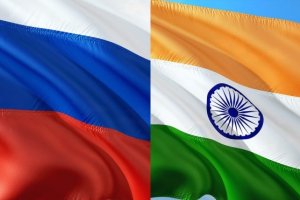
Russia and India will establish a production of spare parts for military vehicles
Several days of a unit of the 58th Army, subdivisions of the internal troops and the Ingush militia fought hard battles with the bandits. Armored vehicles were widely used, artillery and aviation. Despite the clear superiority in forces and means, federal forces failed to defeat detachment P. Гелаева. Having lost 76 killed and 5 prisoners, Adventure, breaking into small groups, hid on the territory of Chechnya. Losses of Russian troops - 21 killed and 17 - wounded. The bandits destroyed two armored personnel carriers and a Mi-24 helicopter. This was the price for the carelessness and belated response of the leadership of the Nazran border detachment.
23 October 2002 Chechen fighters of the field commander M. Baraeva committed a terrorist act in Moscow at the theater center on Dubrovka. Three days more 900 spectators were held hostage. Such a large-scale and impudent outing of militants in the center of the capital, especially after the Russian President announced the completion of the military stage of the counter-terrorist operation in Chechnya, caused a shock. As always, the search for the perpetrators began. First of all, the Ministry of Internal Affairs and the FSB were to blame for the incident., but many politicians and representatives of the security forces linked it to the September breakthrough of the R gang.. Гелаева.
FPS director Colonel-General Totsky took a number of steps, to muffle criticism. Made a decision to form a new special-purpose border detachment with a station in the village of Borzoi, offered the president to relieve the head of the SKRU, Colonel-General Bolkhovitin, from his post as allegedly the main culprit.
According to many FPS generals, it was not an entirely ethical act in relation to the honored border commander. Just two years ago, under the leadership of Bolkhovitin, the special border operation "Argun" was prepared and brilliantly carried out in a short time., formed and in a short time equipped with a new Itum-Kalinsky border detachment, which securely blocked a section of the Russian-Georgian border within Chechnya. The very first clashes showed its high combat effectiveness.. According to the results 1998 of the year SKRU was recognized as the best in the FPS, at 1999 ranked second, and four more parts became the best in their categories. Bolkhovitin himself 2000 year was awarded the Order of Merit for the Fatherland, IV degree, personalized pistol and dirk. Removing an honored general after all this is the height of injustice..
And how did the dismissal itself take place?, defies criticism at all. The decree of the President of Russia was signed 12 December 2002 of the year, Bolkhovitin was not even informed about this. Furthermore, 25 December, his report on the state of military discipline, law and order in subordinate units as the current head of the SKRU was heard at a meeting of the board of the Federal Border Guard Service of Russia. The report went smoothly. And after the report was completed, Colonel General Totsky, as if by the way, announced, that two weeks ago by a presidential decree ... Why was this whole performance needed?, none of those present at the FPS board understood.
The proceedings on the terrorist attack in Moscow lasted several months and ended with the signing by the President of the Russian Federation 11 Martha 2003 year of decree No. 308 "On measures to improve public administration in the field of security of the Russian Federation". The decree abolished the FPS of Russia and transferred its functions to the FSB. Explaining the reasons for the reorganization, Vladimir Putin noted, that in the fight against illicit trafficking in drugs and psychotropic substances, in countering terrorism, "the authorities are not acting effectively and consistently enough". In a narrow circle of heads of special services, Putin allegedly explained his decision to abolish the Federal Border Guard Service of Russia "by the low efficiency of its activities.".
The abolition of the FPS had to happen sooner or later. A few years earlier, an irreversible process of self-destruction had already been launched inside her.. In his first interview, the new head of the border department B. Pronichev made a "policy" statement: the structure subordinate to him will be transformed from a military organization into a special service.
There should be no feats
Feat in war alone - as a rule, reaction to the mistake or carelessness of others. There should be no feats in a properly organized battle. All actions are regulated by combat manuals and develop according to a rigidly composed scenario (the commander's plan), in which there is no place for the individual heroism of military personnel. Of course, casualties are rarely avoided. But strict adherence to the requirements of the statutes and instructions, the ability of commanders to make non-standard decisions allows them to be minimized. This is the talent of the commander.
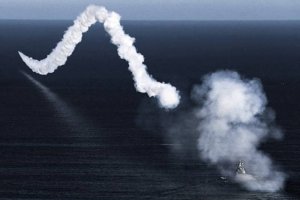
The new version of hypersonic missiles 3M22. Surprises for the US withdrawal from the supporters of the INF Treaty
There is confusion in real combat., accumulation of errors, incompetence of commanders and poor training of subordinates, ignorance of the situation. And - torn there, where is thin. This is where those, who involuntarily have to perform feats. They are then honored, remember, awarded - more often posthumously. But to draw conclusions from miscalculations, a significant part of the commanders and chiefs is unwilling or unable to. The reason for this is the winged expressions that have taken root in our minds for a long time: “Winners are not judged! "And" War will write off everything!»
In the 1990s, border universities switched to new educational standards, began to train officers with higher legal and psychological education. Training time for military disciplines has been reduced. This immediately affected the quality of officer training.. The level of the borderline has dropped noticeably, tactical, fire and physical training of border officers. In its turn, this negatively affected the quality of training of all personnel of the troops.
The shepherd's courage
Georgian shepherd Levan Telidze told border guards about a group of militants, transferred to Russian territory, and one more group, what is preparing for the transition from Georgia to Chechnya, in the Kerigo gorge. Russian President Vladimir Putin awarded the Shepherd Telidze the Order of Courage.
This is what Telidze himself said: “I went to the village of Girevi, where is the OSCE site, asked to call a Russian representative. There was no Russian, was it a Belarusian, whether a Moldovan, but spoke Russian well. I told him, that militants live under their noses. He shook my hand, said "thank you", He promised, what will figure it out. But the head of the OSCE security (Georgian special forces) overheard our conversation. The next day I went to Girevi again, to send a parcel to your cousin with a helicopter. Here I again met the head of the OSCE security. He called me back and began to scold me: what are you, breakwater, chatted yesterday! The head of the border guards also came up ... They began to threaten, that they will send me to figure it out where necessary… So I decided to go, but only in the daytime ... so that they would notice me at the Russian outpost ... I wanted to warn the border guards, that they will go to kill ".
understanding, that he cannot avoid revenge on the part of the Georgian authorities and Chechen fighters, Telidze in the morning 26 July crossed the Russian-Georgian border near the Kerigo Pass and was detained by a border guard. Comparison of these facts allows us to understand, why the Georgian border guards so persistently sought an extraordinary meeting with representatives of the SKRU of the Federal Border Guard Service of Russia, during which they announced the intention of a group of Chechen militants to break into Russian territory in the near future. They got scared, that the OSCE representatives and the Russian side, based on the testimony of the Georgian shepherd, Once again, the Georgian leadership will be accused of supporting Chechen terrorists. So they ran.
While Telidze's information has been rechecked, actions of border guards were coordinated with Moscow, two more groups of Gelayevites on the night of 26 on 27 July 2002 years imperceptibly crossed the border and moved to meet with the first. That is, the information of the shepherd did not play any role.. But a man made a courageous act - there is no doubt.
curious, that two groups of militants marched into the Kerigo gorge through a mined area, which the border guards considered impassable. However, the minefields were demolished by mudflows., caused by the elements unleashed the day before.






